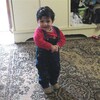
Thousands of Iraqis who have fled the violence in their country are stranded in Lebanon seeking asylum, according to a senior United Nations official. Having not signed the UN’s Convention relating to the Status of Refugees, introduced in 1951, Lebanon does not grant asylum to any refugees, despite the presence on its territory of hundreds of thousands of Palestinians. “Ninety-five percent of asylum seekers today enter Lebanon illegally through the Syrian borders and 80 percent of them are Iraqis. So Lebanese authorities send them to jail, and force them to go back to their countries of origin no matter what,” said Dominique Tohme, Protection Officer in Lebanon for the UN Refugee Agency (UNHCR). Read more about Thousands of Iraqi refugees seek asylum
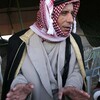
In the Negev Desert village of Twail Abu Jarwal, a Bedouin boy is hammering away at the roof of a new tin shack in the setting sun. Around him are the twisted ruins of the Talalka tribe’s 22 homes and a few animal shacks. The Israeli authorities on 9 January demolished them for the second time in just over a month because Twail Abu Jarwal is among 34 Bedouin villages that officially do not exist, according to the Israeli government. Israeli officials say all homes are illegal because they were built without a permit. “They came at 5 a.m. with police, a helicopter and bulldozers and just demolished everything,” said village chief Aqil Talalka. Read more about Negev Bedouins fight to stay on land
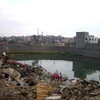
Water specialists have warned that Lebanon will face a severe water shortage over the coming years unless an effective water management system is soon put in place. “Some say that there could be a serious deficit by 2010 to 2015,” said Fadi Comeir, director-general of hydro-electrical equipment in Lebanon’s Energy and Water Ministry. He added that the country might experience shortages even sooner than that. While Lebanon actually has an abundance of rainfall and underground water, for years it has struggled to distribute this water and prevent it becoming contaminated in the earth. Read more about Specialists warn of potential water shortage
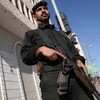
Palestinian refugee Samir Hassan [not his real name] never imagined he would one day replace his UN food coupons with marijuana and heroin, despite the hunger of his children. “My life was normal, everything was normal, but unemployment is difficult and poverty is more difficult. Bad conditions led me down a worse path. I have even had to beg for money,” he said. Hassan, a 35-year-old from the Bureij refugee camp in central Gaza, cares for nine family members including his sick mother. Before 2000, he used to work in Israel’s shipping industry, but with the outbreak of the second intifada [Palestinians’ uprising against Israeli occupation] in that year most Palestinian labourers from Gaza were banned from entering Israel. Read more about Poverty-stricken Palestinians turn to drugs
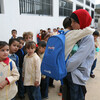
The lack of centralised, detailed development-related data in Lebanon has hampered the efficiency of emergency and rehabilitation efforts, humanitarian experts have said. “Information has been poorly coordinated, and although you can access, for instance, statistics on a given town or village via the municipality, there is no central mechanism to provide a global view of the different projects going on in Lebanon at any given time,” said Rabih Bashour, coordinator for the relief and reconstruction committee at local NGO Al-Huda Society for Social Care. Read more about Poor data limits aid work
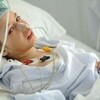
Despite one man being killed and two injured from an explosion on Tuesday in the southern Lebanese village of Marjayoun, mine clearance specialists say that the incidence of cluster bomb casualties in the country has fallen significantly over recent weeks. From an initial average of three accidents a day in the immediate aftermath of the summer war between Israel and Hezbollah, the rate has fallen to an average of three accidents per week. “Over the past three weeks, the rate of casualties has been as low as two victims in one week,” said Dalya Farran, media and post-clearance officer for the United Nations Mine Action Coordination Centre for South Lebanon (MACC). Read more about Rate of cluster bomb casualties falling
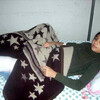
Twelve-year-old Huda Mohammed al-Awadi is recovering on the fourth floor of Gaza City’s Shifa hospital, after being shot by gunmen on 11 December. Huda, who lives in Gaza City’s Omar Al-Mukhtar Street, was hit in the left leg and right foot by gunfire as she was walking to the Cairo Elementary School in the west of the city during an attack that left three children of a senior member of the Palestinian Fatah movement, Baha Balousheh, and their driver dead. She told IRIN of her fear that she could be killed at any instant in a place where security has virtually disappeared. Read more about "I can't believe I'm still alive"
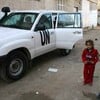
Thousands of Gaza children stayed away from class on Sunday and Monday after the United Nations closed schools to protect staff and pupils from rampant street violence. Three children were killed and others wounded in a morning shooting outside a Gaza City school on 11 December. It is still not clear who was responsible for the shooting. John Ging, head of the UN Relief and Works Agency (UNRWA) in Gaza, told IRIN that the risk of more chaos in some areas was too great to allow children back on the streets. “A large number of schools had to be closed today because we would not place children at risk of being caught up in the crossfire or anything else. And that again is a tragedy for these kids who should be in the classroom rather than at home,” he said. Read more about Gaza violence shuts schools
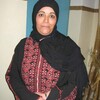
I have been struggling to feed my family since my husband died. UNRWA [United Nations Agency for Relief and Work for Palestine Refugees in the Near East] does not provide me with financial assistance and officials from the Jordanian government say I do not qualify for social aid like many widows in this country because I do not have Jordanian nationality. I am paying the price of my parent’s decision to come to Jordan after the 1967 Arab-Israeli war. Refugees who came to the country after that date were given temporary passports but not Jordanian nationality, contrary to those who arrived in Jordan after [the Arab-Israeli conflict in] 1948. Read more about "Nobody cares about refugees from Gaza"
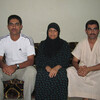
Palestinian refugees living in Iraq say there is increasing fear in their community after a recent attack on a predominantly Palestinian Baghdad neighbourhood left nine people dead and several injured, including children. “We are getting worried about our situation in Iraq. We cannot leave the country because the borders are closed to us and the government doesn’t give us any hope that it can increase our security,” said Ahmed Muffitlak, spokesman for the Baghdad-based Palestinian Muslims Association (PMA). On 13 December, local militia attacked the al-Baladiya district of the capital, where hundreds of Palestinians have lived for years. Read more about Palestinian refugees fear for their lives after recent attack









